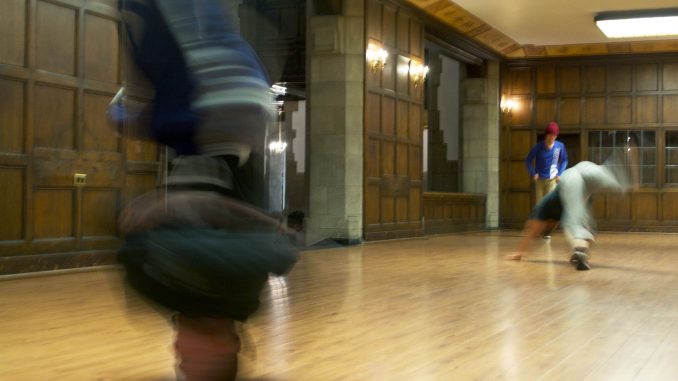
While working on Wall Street for Goldman Sachs banking firm in the early ‘80s, Philly native Steve Graham had no qualms with wrinkling his suit.
“I would go out on the street in Manhattan on the weekends to challenge the street hitters,” Graham said. “Some of them, in effect, subsumed me into their crew; they used to pull me out of the crowd with my business suit on and I’d sort of break it out.”
Graham, now 56, used his knowledge of the business and breakdancing worlds to form the Urban Dance and Education Foundation in 2013. The nonprofit, abbreviated as UDEF, uses dance as a catalyst to fund breakdancing-centered educational clinics, workshops and performance camps.
UDEF utilizes the physical, disciplinary, social and artistic aspects of breakdance to teach children life skills in a way “similar to getting involved with a sport,” Graham said.
This year, the second annual Pro Breaking Tour, a national breakdance tournament created by UDEF, is modeled after sporting events like the PGA Tour. The circuit will bring together breakers from across the United States.
“There’s a lot of breaking events that take place all over the country and globally, but for the most part, the events are individual exhibitions sort of like … golf was in the ‘30s or ‘40s,” Graham said. “I’m helping to start the Pro Breaking Tour not just because I like breaking, but because I thought it was an effective way … to have a good community impact.”
Each of the tour’s 50 events fall into one of four tiers based on skill level—Satellite, Futures, Challenger and Championship. Breakers gathered Oct. 10 and 11 at YSC Stadium in Wayne, Pennsylvania, for the Silverback Open Championships, one of the largest competitions on the Tour’s circuit.
Professional breaker and 2008 communication studies alumnus Jake Hill, known in the breaking community as “Jake the Snake,” is one of this year’s contenders.
A 16-year veteran of the breakdance scene, Hill sees breaking as an effective form of emotional release—he even teaches the techniques to Graham’s children.
“It’s about being with my friends and letting whatever you have inside, out,” Hill said. “Whether that’s anger, frustration or just a desire to do something cool.”
Hill believes the Pro Breaking Tour can create a sense of unity between promoters and breakers.
“It’s been sort of this tribal mentality where no one wants to share their piece of the pie and because of that they haven’t been able to really move forward,” Hill said. “That’s one thing I think all of us would like to see happen out of this UDEF movement and Pro Breaking Tour; to change those conditions so that dancers are respected and … are able to realize a career.”
Richie Maguire, a 2003 business marketing alumnus, has been breakdancing professionally most of his life and performed for a crowd of 20,000 while competing in the 2008 R-16 B-boy tournament in South Korea.
Known by fellow breakers as “Gymnasty,” a nod to his experience on Temple’s gymnastics team, Maguire sees UDEF and the Pro Breaking Tour as an effective middle ground between the financial and artistic sides of breakdancing.
“There’s a big argument on one hand that B-boy and breaking is a dance, it’s an art form and should be displayed as such and shouldn’t be presented as a sport,” Maguire said. “The Pro Breaking Tour is a great step, it has to be respectful of the roots and history of the dance, but I think it has massive potential.”
Akhil Golla, a junior biology major and president of on-campus breakdancing club Temple Bboys, planned to attend The Silverback Championships with other local breakers.
Golla respects the sense of camaraderie offered by UDEF and the Tour.
“Whenever you go see other B-boys fight, like go dance, and they’re a lot better than you, it invigorates you to try even harder,” Golla said. “I think that’s great because it creates a community. It brings everyone together.”
Eamon Dreisbach can be reached at eamon.noah.dreisbach@temple.edu.



Be the first to comment